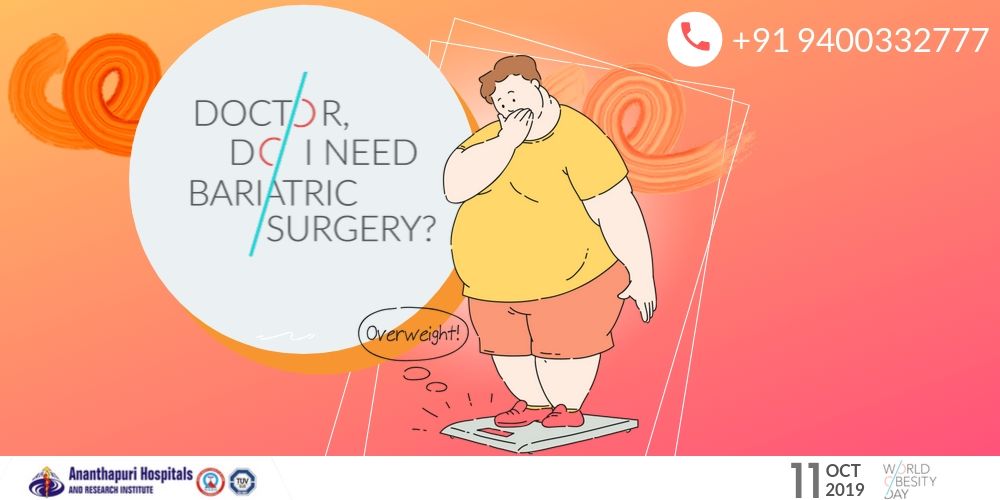- 11/October/2019

World Obesity Day - Ananthapuri Hospitals , Trivandrum
Here is a doctor’s narrative on bariatric surgery:
“Good morning Doctor. I have tried everything. Different diets, exercises and even putting myself to starve. Nothing is working. I am not being able to play with my kids or do my daily activities without my wife’s help. I have absolutely no confidence in me right now. I am worried about being a burden to the family. Please help”, said a patient who consulted me a week back. “Calm down. I will get you out of this”, I said to him.
This conversation is similar to a lot of other conversations that I have with patients who suffer from severe obesity.
So why am I talking about this today?
Because today, the 11th of October, is World Obesity Day. World Obesity Day is celebrated with the aim of raising awareness about the risks of adopting unhealthy dietary habits and obesity. The day also highlights the importance of a healthy diet and encourages at least 30 minutes of physical activity every day. With today’s modern lifestyle and unhealthy eating habits, obesity is a rising issue.
Read the article to learn more about this condition and its treatment.
-
So, what is obesity?
A person is said to be obese if he or she carries surplus weight or body fat, in other words, if his or her BMI is high.
Body mass index (BMI) is a tool that is used to gauge if a person’s weight is proportional to their age, sex, and height. Patients can be categorised as overweight, slightly obese, moderately obese or severely obese. Here is what a BMI scale reading can tell about you:
- If your BMI scale reads 25.0 to 29.9, then you are overweight.
- If your BMI scale reads 30.0 to 34.9, then you are slightly obese and need to stay cautious
- If your BMI scale reads 35.0 to 39.9, then you are moderately obese
- If your BMI scale reads equal to or greater than 40.0, you are severely obese and this indicates danger
While being overweight or moderately obese can interrupt your daily activities and lessen your quality of life, this condition can be controlled through diet and exercise.
Being severely obese can put you at risk of various health issues. Diets and exercise may fail to help a severely obese person to lose weight. The only effectual solution is bariatric surgery in this case.
-
What is bariatric surgery?
Bariatric surgery is a collective term for weight-loss surgeries that help you lose weight by bringing alterations to your digestive system to either restrict how much food you can consume or how much food your gut can absorb. The patient undergoing this surgery should reduce food intake and follow a post-bariatric surgery diet to see the full results.
-
What qualifies you for bariatric surgery?
Bariatric surgery is not for everyone who is overweight. Bariatric surgery could be an option if you are:
- A person with a BMI of 40 or above
- A person with a BMI greater than or equal to 35 and suffer from serious obesity-related diseases such as type II diabetes, hypertension, sleep apnea, gastrointestinal disorders, heart disease and so on
- A person who is unable to lose weight despite prior weight loss efforts like diet and exercise
You may have to undergo an extensive screening process if you meet the medical guidelines that qualify you for bariatric surgery. You may also have to commit to long-term follow-up strategies that might bring changes to your nutrition, lifestyle and behaviour.
-
Which is the best bariatric surgery?
There is no ‘best bariatric surgery’. A surgery that is best suited for you may not be suitable for another person. The type of bariatric surgery most appropriate for you depends on several factors including the risks of the surgery, the degree of obesity, your eating pattern, concomitant health conditions, and any previous surgery you have had.
There are four common types of bariatric or weight-loss surgery. They include:
- Roux-en-Y gastric bypass surgery
- Laparoscopic adjustable gastric banding
- Duodenal switch with biliopancreatic diversion
- Sleeve gastrectomy
5. How dangerous is bariatric surgery?
All surgical procedures possess a certain amount of risk. Some of them include:
-
Acid reflux
Acid reflux is a common condition that features heartburn in the lower chest area. It happens when stomach acid flows back up into the food pipe
-
Chronic nausea and vomiting
Chronic nausea is a symptom of many disorders related to the digestive system
-
Dilation of oesophagus
Oesophageal dilation is a procedure that allows your doctor to dilate or stretch a narrowed area of your oesophagus
-
Intestinal obstruction (blockage)
In some cases, scar tissue or inflammation can narrow the new connection between the stomach and intestine. This is called a stricture. Strictures usually develop four to six weeks after surgery and affect less than five per cent of bariatric surgery patients
-
Other long-term risks
Bariatric surgery may carry some long-term risks such as nausea, dizziness, low blood sugar, malnutrition, vomiting, ulcers, bowel obstruction, and hernias
-----------------------------------------------------------------------------------------------------------------------
Ananthapuri hospital has a specialised team of gastroenterologists and gastro-endoscopic surgeons who offer expert care. To fully understand your treatment options, call us at +91 9400332777 or visit our hospital at Chacka, NH Bypass, Thiruvananthapuram.

